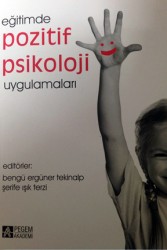“When I was 5 years old, my mother always told me that happiness was the key to life. When I went to school, they asked me what I wanted to be when I grew up. I wrote down “happy’. They told me I didn’t understand the assignment, and I told them they didn’t understand life.” This quote from the famous musician, John Lennon provides the opening for a book recently published by Counseling Education Associate Professor, Dr. Bengu Erguner-Tekinalp.
 Dr. Tekinalp co-edited the book with Dr. Serife Terzi entitled, “egitimde pozitif psikoloji uygulamalari.” In English the title translates to, “Positive Psychology Applications in Education.” The book is written in Dr. Erguner-Tekinalp and Dr. Terzi’s native language, Turkish. It is the first book written in Turkish that provides comprehensive knowledge on the application of positive psychology in education. Erguner-Tekinalp stated, “This is also a much needed book in the English language as well. The editors have contemplated the idea of writing a similar book in English. Recently, parents also praised the book in Turkey and asked if the same book can be written for parents, instead of educators.”
Dr. Tekinalp co-edited the book with Dr. Serife Terzi entitled, “egitimde pozitif psikoloji uygulamalari.” In English the title translates to, “Positive Psychology Applications in Education.” The book is written in Dr. Erguner-Tekinalp and Dr. Terzi’s native language, Turkish. It is the first book written in Turkish that provides comprehensive knowledge on the application of positive psychology in education. Erguner-Tekinalp stated, “This is also a much needed book in the English language as well. The editors have contemplated the idea of writing a similar book in English. Recently, parents also praised the book in Turkey and asked if the same book can be written for parents, instead of educators.”
The content of the book explores various psychology concepts in education. The Positive Psychology Movement has gained popularity in the world of counseling. Researchers and practitioners have started to focus on strengths and values of individuals as well as resilience, thriving and coping rather than pathology. The editors hope that the ideas presented in the book will be applied from the smallest, poorest remote village schools to the richest, urban private schools.
From deciding on the topics to cover, to contacting authors who each contributed by writing a chapter within their field of expertise, to hours and hours of editing – it took two years from conception to publication. Dr. Erguner-Tekinalp and Dr. Terzi are colleagues who started their academic careers as research assistants at Gazi University, Ankara, Turkey. Even though they have been separated by thousands of miles, they have kept in touch.
While Dr. Erguner-Tekinalp is not using the book in her own curriculum, her co-editor, Dr. Terzi will use this in her course that she teaches in her doctoral counseling program in Turkey. Both professors reflected, “After all, our greatest wish for our children is for them to be happy in life.”

